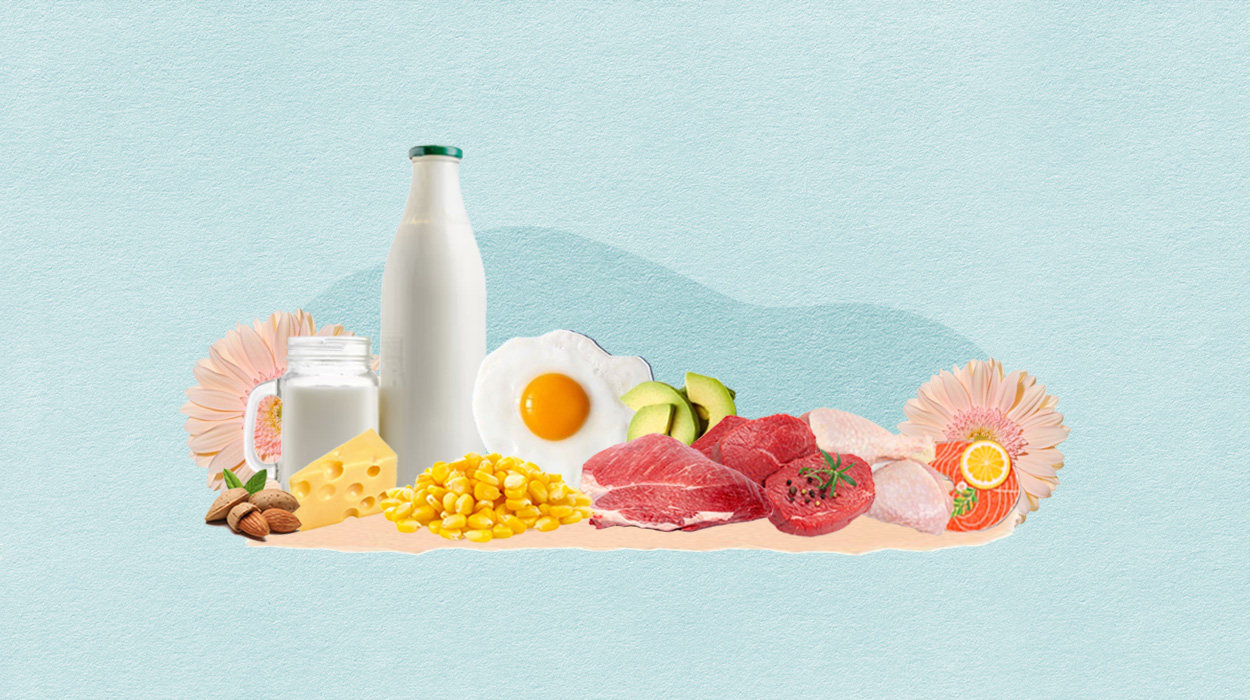7 Best Milk For Gut Health In 2024 – Here’s Our Nutrition Expert’s Recommendations
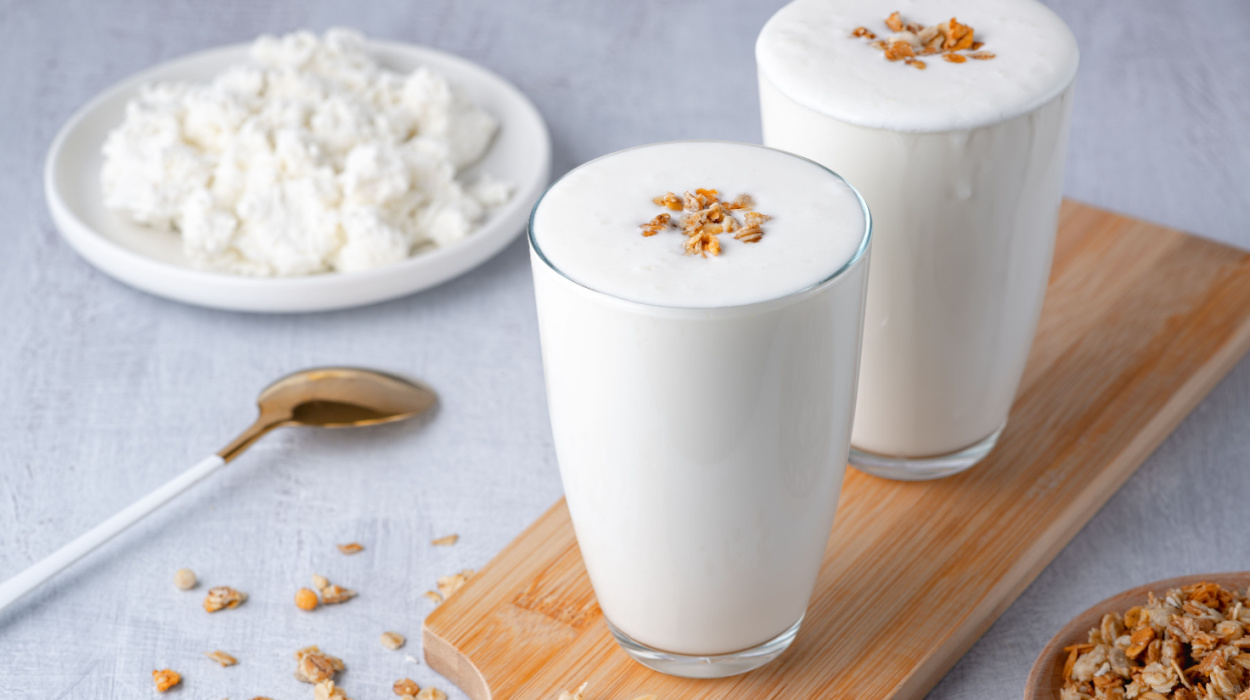
Dairy milk is a widely consumed beverage, however, not all individuals can drink it. Roughly 68% of people worldwide have lactose intolerance.[1] They lack lactase,[2] the enzyme needed to break down lactose, a carbohydrate found in dairy foods.
If you are lactose-intolerant, drinking milk can cause unpleasant gastrointestinal side effects[3] such as gas, bloating, and diarrhea. People with milk allergies[4] must also avoid milk to prevent allergic reactions. Luckily, there are many plant-based milk alternatives that may be easier to digest. However, the best milk for gut health depends on the individual.
7 Types Of Milk That Heal Your Gut
If cow’s milk is causing you digestive upset, you’re not alone. Many people are turning to other types of milk to improve their digestive health. Consider these 7 alternatives to cow’s milk for better gut health:
- Goat’s Milk.
- Almond Milk.
- Soy Milk.
- Oat Milk.
- Cashew Milk.
- Rice Milk.
- Hemp Milk.
7 Best Types Of Milk For Better Gut Health
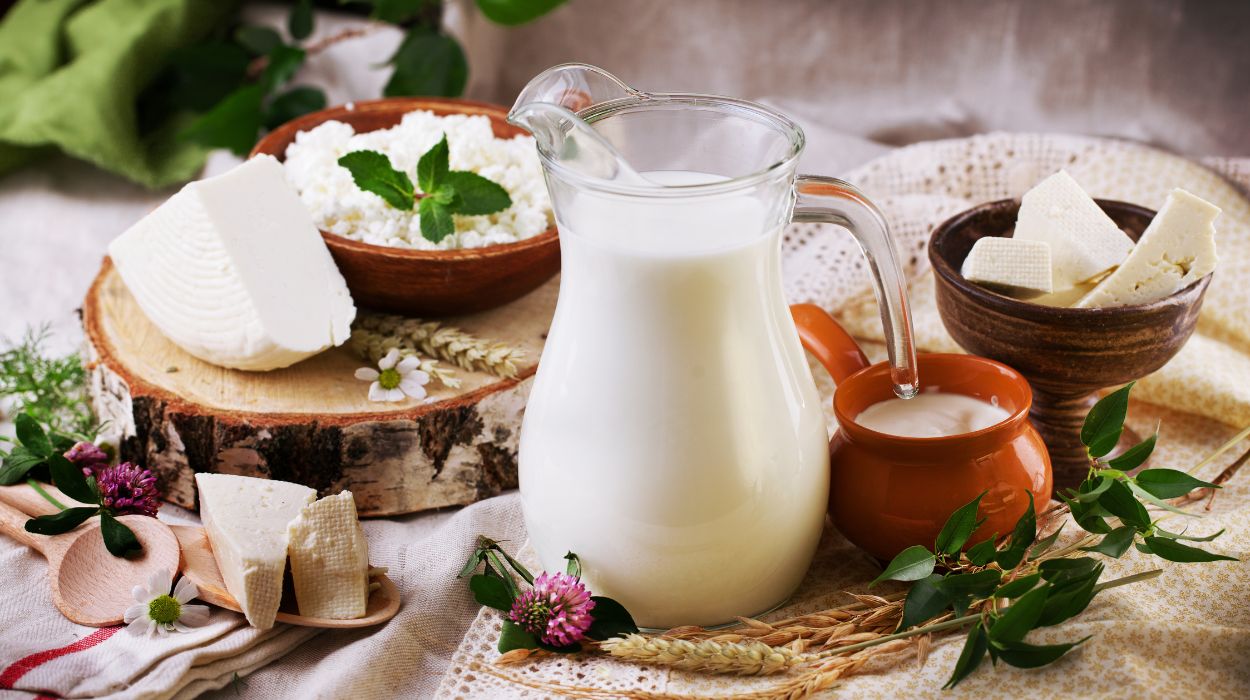
Cow’s milk can be difficult for many people to digest, particularly those with milk allergies or those who are lactose-intolerant. It’s estimated that one in fifty people[5] in the U.S. have a medically confirmed milk allergy and over half the world’s population cannot digest lactose..
Because of this, plant-based milks have grown in popularity in recent years. As a result, dairy milk consumption[6] has decreased. Consider the following cow milk alternatives.
Featured Partner Offer
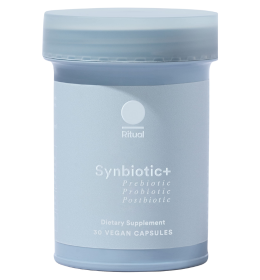
Ritual Synbiotic+
- 3-in-1 formula: prebiotics, probiotics, and probiotics
- Supports a balanced gut microbiome
- Supports bloating, gas, and diarrhea
- Supports the growth of beneficial gut bacteria
- Vegan and Third-party tested
Get 25% Off First Month By Using “FALL25” at Checkout
Goat’s Milk
Goat’s milk does contain lactose, as all mammal milk[7] does, however, some people find it easier to digest than cow’s milk.
Nutritionally, goat’s milk is not too dissimilar[8] to cow’s milk. Goat’s milk has 4.5 grams of carbohydrate[9] per serving and cow’s milk[10] has 4.67 grams.
However, the fat molecules[11] in goat’s milk are smaller than those in cow’s milk. For some, this may be the determining factor that could make goat’s milk easier to tolerate.
Almond Milk
Almond milk is made by soaking almonds overnight and then blending them with water. Many plant-based milks[12] are made using similar methods.
Note that almonds lose most of their beneficial fiber[13] during the milking process. Compare half a cup of raw almonds,[14] which has 12 grams of fiber, with half a cup of almond milk,[15] which has less than one gram of fiber.
However, just because almond milk may not enhance gut health, it does not make it harmful for gut health, either. Almond milk can be gentler on the gut than dairy for many individuals.
Soy Milk
Soy is a common food allergy[16] and should be avoided for anyone allergic to it. However, for those who are not allergic to soy, soy milk can be an excellent choice for your coffee, cereal, and smoothies.
Fermented soy milk,[17] especially, has been shown to make positive changes in the gut microbiome. This is most likely due to soy’s probiotics which feed beneficial bacteria in the digestive tract. Healthy adults can consume between 15-25 grams of soy protein[18] daily.
Oat Milk
Oat milk is a lactose-free milk that can provide additional health benefits where cow’s milk falls short.
Specifically, oat milk contains vitamins, minerals, and dietary fiber[19] that dairy milk lacks. The dietary fiber in oat milk can help lower cholesterol and blood lipids by delaying gastric emptying.
Depending on your health goals, it’s worth noting that oat milk is generally higher in carbohydrates than dairy milk, but lower in fat.
Cashew Milk
Not only is cashew milk safe for the people who can’t digest cow’s milk, but cashew byproducts, such as fermented cashew milk[20] can promote a healthy gut. Fermented cashew milk contains beneficial gut bacteria strains and has properties that protect bacteria in the digestive tract.
Fermented cashew milk also has high amounts of antioxidants,[21] which reduce disease risk by fighting off free radicals that can damage your cells.
Rice Milk
Rice milk can be beneficial for gut health in healthy individuals. One study[22] found that proteins in rice milk help decrease inflammation. However, for those with an allergy to rice milk, rice milk had the opposite effect, creating more inflammation and gut barrier leakage.
This reinforces the idea of bio-individuality in nutrition. What works for one person may not work for another. It’s important to avoid any food you have an allergy or suspected allergy to. However, if you are not allergic to rice milk, it may prove to be a lactose-free, gut-friendly milk for you.
Hemp Milk
In a study conducted on mice, scientists found that foods made from hemp[23] seeds not only provide essential nutrients but can also decrease inflammation. Furthermore, hemp foods may improve the integrity of the gut lining.
Hemp milk is also filled with plant-based protein[24] which can have positive effects on the gut microbiome.[25]
The Link Between Milk And Gut Health
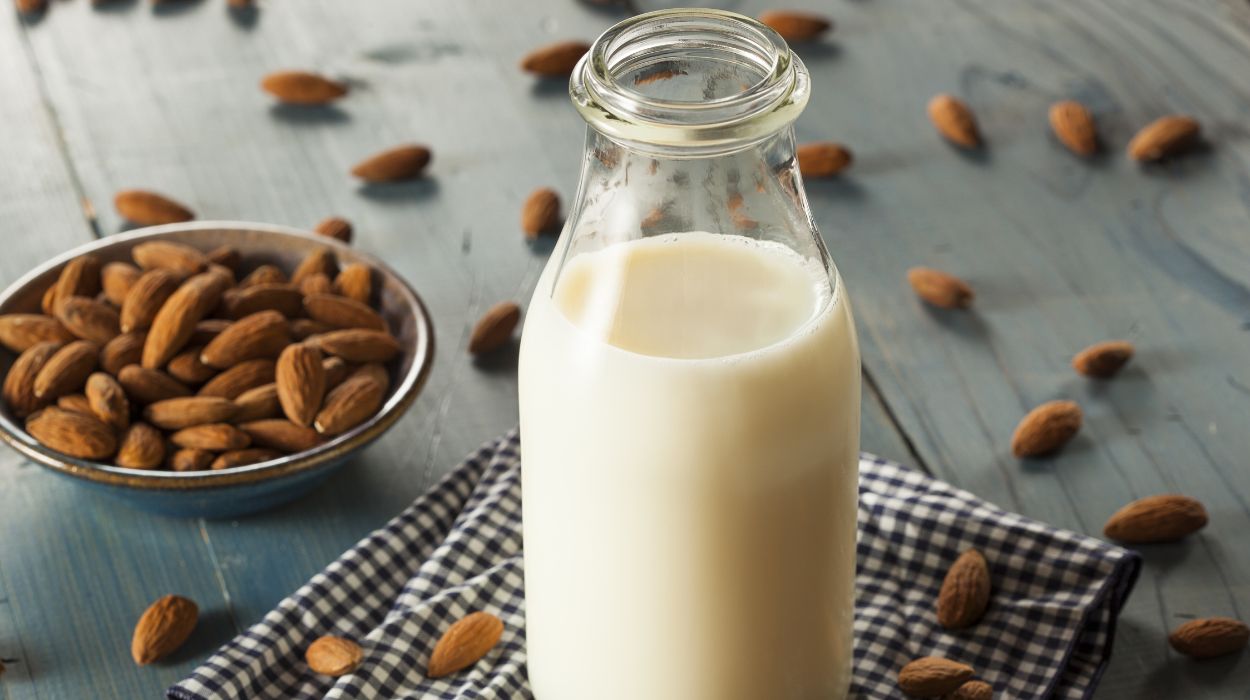
Intolerances And Allergies
There are two main links between dairy and gut health: lactose intolerance and milk allergies.[26]
Here are the differences:
Lactose intolerance is due to the absence of lactase. In this case, the carbohydrate in dairy cannot be digested. Lactose intolerance can be uncomfortable but is usually not serious.[27] It also takes a few hours for symptoms to develop.
A milk allergy is an allergic reaction to the protein found in milk. An allergy can be life-threatening, with symptoms ranging from digestive discomfort to hives, wheezing, itching, and shortness of breath. Symptoms of a milk allergy will usually occur immediately after ingesting the milk.
The reactions of both an intolerance and an allergy happen once the food has entered the digestive system.
Irritable Bowel Syndrome
Although the symptoms of irritable bowel syndrome,[28] or IBS, are similar to lactose intolerance, these conditions are not necessarily linked.[29] A person can have IBS without lactose intolerance, or lactose intolerance without IBS.
If you have gas from IBS or lactose intolerance, consider simple ways to relieve bloating such as farting, managing stress, and eating foods that can help with bloating. For some people, dairy foods like yogurt may actually help relieve bloating due to the probiotics in the food.
For additional gut support, ask your doctor about taking vitamins for gut health or pills that can help you debloat.
Is Milk Good For Gut Health?
This depends on the individual. On one hand, dairy helps increase beneficial bacteria[30] in the digestive system, which can improve gut health. Additionally, dairy can diversify[31] the gut microbiome, providing different strains of bacteria that can also promote a healthy gut. In this sense, dairy can be beneficial for gut health.
However, despite its positive influence on the gut microbiota, roughly 68% of people worldwide cannot tolerate lactose. Many others may be allergic to milk. For these people, milk can be harmful to the gut.
Summary
Given the prevalence of lactose intolerance, many people are favoring plant-based milk to avoid unpleasant digestive symptoms from cow’s milk. There is no particular milk that is best for gut health. There are many options to choose from.
Some plant-based milks enhance gut health, while others simply do not deplete gut health. Rather, they serve as neutral, non-dairy alternatives. While each type of milk offers different nutritional properties and health benefits, you will have to experiment with different kinds of milk to find the one that is most gut-friendly for you.
Frequently Asked Questions
This depends on the person. For the many people who are lactose-intolerant, plant-based milks are good for gut health because they do not contain any lactose.
IBS is experienced differently by different people. Some people experience painful bloating and gas, while others may struggle with diarrhea or constipation. A plant-based milk will likely be better than dairy milk, but each person must experiment for themself.
Possibly. If you are not lactose-intolerant and do not have a milk allergy, dairy milk may work better for you than almond milk. However, because lactose intolerance is common, many people will find almond milk easier to digest.
It’s possible that any milk could cause bloating. Plant-based milk will not aggravate lactose intolerance. However, this does not guarantee that you won’t experience bloating from plant-based milk.
Yes and no. Dairy milk has nutrients and probiotics that feed beneficial bacteria in the gut which can build a healthy gut microbiome. However, dairy milk can irritate the gut in many people. This is individual.
It can be. Assuming you have no allergy or sensitivity to oats, oat milk may be gentler on the gut than dairy for some individuals.
Resources
- and, D. (2023). Definition & Facts for Lactose Intolerance. [online] National Institute of Diabetes and Digestive and Kidney Diseases. Available at: https://www.niddk.nih.gov/health-information/digestive-diseases/lactose-intolerance/definition-facts#:~:text=Experts%20estimate%20that%20about%2068,world%27s%20population%20has%20lactose%20malabsorption.&text=Lactose%20malabsorption%20is%20more%20common,the%20world%20than%20in%20others.
- NHS Choices (2023). Lactose intolerance. [online] Available at: https://www.nhs.uk/conditions/lactose-intolerance/#:~:text=The%20most%20common%20cause%20of%20lactose%20intolerance%20is%20when%20the%20body%20does%20not%20make%20enough%20of%20an%20enzyme%20called%20lactase%2C%20which%20helps%20you%20digest%20lactose.
- and, D. (2022). Lactose Intolerance – NIDDK. [online] National Institute of Diabetes and Digestive and Kidney Diseases. Available at: https://www.niddk.nih.gov/health-information/digestive-diseases/lactose-intolerance.
- Elif Feyza Aydar, Tütüncü, S. and Beraat Özçelik (2020). Plant-based milk substitutes: Bioactive compounds, conventional and novel processes, bioavailability studies, and health effects. Journal of Functional Foods, [online] 70, pp.103975–103975. doi:https://doi.org/10.1016/j.jff.2020.103975.
- Warren, C., Agrawal, A., Gandhi, D. and Gupta, R.S. (2022). The US population-level burden of cow’s milk allergy. World Allergy Organization Journal, [online] 15(4), pp.100644–100644. doi:https://doi.org/10.1016/j.waojou.2022.100644.
- Wolf, C.A., Malone, T. and McFadden, B.R. (2020). Beverage milk consumption patterns in the United States: Who is substituting from dairy to plant-based beverages? Journal of Dairy Science, [online] 103(12), pp.11209–11217. doi:https://doi.org/10.3168/jds.2020-18741.
- Nissim Silanikove, Leitner, G. and Merin, U. (2015). The Interrelationships between Lactose Intolerance and the Modern Dairy Industry: Global Perspectives in Evolutional and Historical Backgrounds. Nutrients, [online] 7(9), pp.7312–7331. doi:https://doi.org/10.3390/nu7095340.
- Milan, A.M., Hodgkinson, A.J., Mitchell, S.M., Utpal Kumar Prodhan, Prosser, C.G., Carpenter, E., Fraser, K. and Cameron‐Smith, D. (2018). Digestive Responses to Fortified Cow or Goat Dairy Drinks: A Randomised Controlled Trial. Nutrients, [online] 10(10), pp.1492–1492. doi:https://doi.org/10.3390/nu10101492.
- Usda.gov. (2023). FoodData Central. [online] Available at: https://fdc.nal.usda.gov/fdc-app.html#/food-details/1097531/nutrients.
- Usda.gov. (2023). FoodData Central. [online] Available at: https://fdc.nal.usda.gov/fdc-app.html#/food-details/1097512/nutrients.
- Clark, S. and Garcia, M. (2017). A 100-Year Review: Advances in goat milk research. Journal of Dairy Science, [online] 100(12), pp.10026–10044. doi:https://doi.org/10.3168/jds.2017-13287.
- Mäkinen, O.E., Viivi Wanhalinna, Zannini, E. and Arendt, E.K. (2015). Foods for Special Dietary Needs: Non-dairy Plant-based Milk Substitutes and Fermented Dairy-type Products. Critical Reviews in Food Science and Nutrition, [online] 56(3), pp.339–349. doi:https://doi.org/10.1080/10408398.2012.761950.
- Fu, J., Zheng, Y., Gao, Y. and Wang, X. (2022). Dietary Fiber Intake and Gut Microbiota in Human Health. Microorganisms, [online] 10(12), pp.2507–2507. doi:https://doi.org/10.3390/microorganisms10122507.
- Usda.gov. (2023). FoodData Central. [online] Available at: https://fdc.nal.usda.gov/fdc-app.html#/food-details/170567/nutrients.
- Usda.gov. (2023). FoodData Central. [online] Available at: https://fdc.nal.usda.gov/fdc-app.html#/food-details/174832/nutrients.
- Cdc.gov. (2015). Food Allergy Action Month | Blogs | CDC. [online] Available at: https://blogs.cdc.gov/nchs/2015/05/11/2788/.
- Belobrajdic, D.P., James-Martin, G., Jones, D. and Tran, C. (2023). Soy and Gastrointestinal Health: A Review. Nutrients, [online] 15(8), pp.1959–1959. doi:https://doi.org/10.3390/nu15081959.
- Messina, M., Duncan, A., Messina, V., Lynch, H., Kiel, J. and Erdman, J.W. (2022). The health effects of soy: A reference guide for health professionals. Frontiers in Nutrition, [online] 9. doi:https://doi.org/10.3389/fnut.2022.970364.
- Yu, Y., Li, X., Zhang, J., Xiao, L., Wang, J. and Sun, B. (2023). Oat milk analogue versus traditional milk: Comprehensive evaluation of scientific evidence for processing techniques and health effects. Food Chemistry: X, [online] 19, pp.100859–100859. doi:https://doi.org/10.1016/j.fochx.2023.100859.
- Marcos Edgar Herkenhoff, Dantas, U., Luiz, Mateus Kawata Salgaço, Kátia Sivieri and Marta, S. (2023). Cashew By-Product as a Functional Substrate for the Development of Probiotic Fermented Milk. Foods, [online] 12(18), pp.3383–3383. doi:https://doi.org/10.3390/foods12183383.
- Medlineplus.gov. (2017). Antioxidants. [online] Available at: https://medlineplus.gov/antioxidants.html.
- D Świątecka, Lidia Hanna Markiewicz and Wróblewska, B. (2016). The effect of hydrolysates of proteins from rice milk on the physiological response of enterocytes and on the adhesion of bacteria from healthy and allergic people – an in vitro study. Central European Journal of Immunology. [online] doi:https://doi.org/10.5114/ceji.2016.65135.
- Rim Ben Necib, Manca, C., Lacroix, S., Martin, C., Flamand, N., Vincenzo Di Marzo and Silvestri, C. (2022). Hemp seed significantly modulates the endocannabinoidome and produces beneficial metabolic effects with improved intestinal barrier function and decreased inflammation in mice under a high-fat, high-sucrose diet as compared with linseed. Frontiers in Immunology, [online] 13. doi:https://doi.org/10.3389/fimmu.2022.882455.
- El-Sohaimy, S.A., Natalia Vladimirovna Androsova, Abduvali Djabarovich Toshev and El‐Enshasy, H.A. (2022). Nutritional Quality, Chemical, and Functional Characteristics of Hemp (Cannabis sativa ssp. sativa) Protein Isolate. Plants, [online] 11(21), pp.2825–2825. doi:https://doi.org/10.3390/plants11212825.
- Wu, S., Bhat, Z.F., Gounder, R.S., Isam A.Mohammed Ahmed, Al‐Juhaimi, F.Y., Ding, Y. and Alaa El‐Din A. Bekhit (2022). Effect of Dietary Protein and Processing on Gut Microbiota—A Systematic Review. Nutrients, [online] 14(3), pp.453–453. doi:https://doi.org/10.3390/nu14030453.
- Edwards, C.W. and Younus, M.A. (2023). Cow Milk Allergy. [online] Nih.gov. Available at: https://www.ncbi.nlm.nih.gov/books/NBK542243/.
- NHS Choices (2023). Food intolerance. [online] Available at: https://www.nhs.uk/conditions/food-intolerance/#:~:text=Unlike%20a%20food%20allergy%2C%20a%20food%20intolerance%20is%20not%20caused%20by%20your%20immune%20system%20overreacting%20to%20certain%20types%20of%20food%2C%20which%20means%20you%20cannot%20have%20a%20serious%20allergic%20reaction.
- NHS Choices (2023). Symptoms – Irritable bowel syndrome (IBS). [online] Available at: https://www.nhs.uk/conditions/irritable-bowel-syndrome-ibs/symptoms/.
- Cancarevic, I., Rehman, M., Iskander, B., Lalani, S. and Bilal Haider Malik (2020). Is There a Correlation Between Irritable Bowel Syndrome and Lactose Intolerance? Cureus. [online] doi:https://doi.org/10.7759/cureus.6710.
- Aslam, H., Marx, W., Rocks, T., Loughman, A., Chandrasekaran, V., Anu Ruusunen, Dawson, S., West, M., Mullarkey, E., Pasco, J.A. and Jacka, F.N. (2020). The effects of dairy and dairy derivatives on the gut microbiota: a systematic literature review. Gut microbes, [online] 12(1), pp.1799533–1799533. doi:https://doi.org/10.1080/19490976.2020.1799533.
- Menglei Shuai, Zuo, L.-S.-Y., Miao, Z., Gou, W., Xu, F., Jiang, Z., Ling, C., Fu, Y., Xiong, F., Chen, Y. and Zheng, J. (2021). Multi-omics analyses reveal relationships among dairy consumption, gut microbiota and cardiometabolic health. EBioMedicine, [online] 66, pp.103284–103284. doi:https://doi.org/10.1016/j.ebiom.2021.103284.
More from Digestion
-
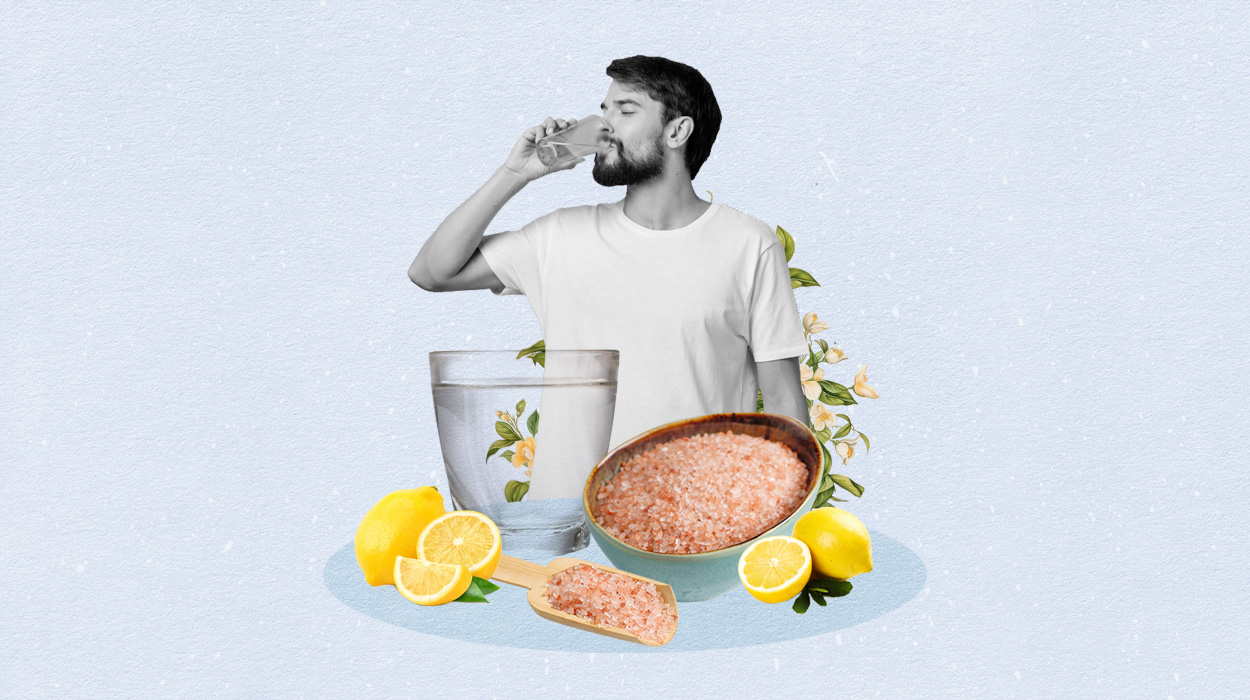
Salt Water Colon Cleanse: Benefits, How To Do It & More In 2024
Jill Levy, Health & Nutrition Writer
May 02, 2024
A salt water colon cleanse involves drinking a solution made with salt/sodium dissolved in water to clean out the bowels and…Read more -

10 Best Foods For Gut Health And Weight Loss In 2024 – Health Expert’s Recommendations
May 02, 2024
Recently, alterations in the gut[1] have gained attention as a potential factor contributor to diseases[2] like irritable bowel syndrome, also known…Read more -

Fermented Foods For Gut Health – 8 Best Fermented Foods That Are Beneficial For Your Gut In 2024
January 16, 2024
Fermentation sounds like some fancy culinary technique, but it’s pretty common. Think about bread, cheese, beer, and even pickles—all are fermentation…Read more -

Gut Health And Anxiety 2024: Is There A Connection Between The Two?
January 13, 2024
Ever get that fluttery feeling in your stomach when you’re anxious? It turns out that your gut and brain have a…Read more



